Tuition Fees – means testing?
The Higher Education Policy Institute and Canadian Higher Education Strategy Associates have published a joint research paper on means-tested tuition fees for higher education – Targeted Tuition Fees – Is means-testing the answer? It explores the different funding approaches around the world considering the three major approaches to subsiding students in HE:
- Equal subsidisation, resulting in a system of free tuition
- Post-hoc subsidy (eg. England) in which those with smaller financial returns pay less
- Pre-hoc subsidy, in which reductions in net price are given to poorer students, usually through a system of grants
Targeted free tuition starts from the notion that income-contingent fee loans do improve access but don’t do enough to help those from the poorest households, many of which are extremely debt adverse, and it leads to these families ruling out attending HE. Targeted free tuition suggests means testing and offering those on lowest income partial or full exemption from tuition fees.
The report concludes that “targeted free tuition has both an attractive political and economic logic: it provides benefits to those who need it without providing windfall gains to those who do not. Evidence from several countries over many years tells us that students from poorer backgrounds have a higher elasticity of demand than students from wealthier ones. Put simply, there is far more value for money in reducing or eliminating net tuition for low income students than there is in doing so for wealthier ones”.
Nick Hillman (HEPI) spoke on the report during the Today programme on Radio 4 on Thursday.
Means testing tuition fees is another interesting contribution to the Post-18 Review discussion. It would of course, increase costs, just at the time when the accounting treatment is about to change and the existing costs become more visible. You’ll remember we reported last week that the Post-18 Review report is delayed awaiting outcomes on the decision of how to account for student loans, but will Phillip Augar use the delay to cogitate further on tuition fees?
There is an interesting debate, though, about the tension between means testing families at one level (as already happens for maintenance loans) and then basing everything on the graduate premium – i.e. the income of the graduate not the family. The government will say that the current position is fairer because the amount repaid is all based on graduate income, whereas under this system the merchant banker children of WP families would repay nothing. The opposing side was expressed on Radio 4 by Polly Mackenzie of Demos. She said that technocratic solutions developed by policy wonks would not solve the problem of student finance. That the public were emotionally opposed to debt and the system is too broken to survive, regardless of the merits of rebranding, renaming or tweaking it.
Alex Usher, the Canadian author of the paper writes for Wonkhe in A case for means-tested fees.
While Becca Bland from Stand Alone highlights that students with complex family situations which approach but don’t quite meet categorisation as an independent student fall through the means testing cracks and all too often can’t access sufficient funding to access or complete HE study. See Family means-testing for student loans is not working.
Education Spending
The Institute for Fiscal Studies (IFS) released its annual report on England’s education spend. On HE it summarises:
- Reforms to higher education funding have increased university resources and made little difference to the long-run cost to the public purse. Universities currently receive just over £9,000 per full-time undergraduate student per year to fund their teaching. This is 22% higher than it was in 2011, and nearly 60% more than in 1997. Reforms since 2011 have cut the impact on the headline measure of the government’s deficit by about £6 billion per cohort entering higher education, but the expected long-run cost to the taxpayer has fallen by less than £1 billion.
The report hit the headlines for the decline in FE spending; this heightened the current speculation that FE spend may be addressed through the post-18 tertiary education funding review. Research Professional report that the IFS write a
- “key challenge” facing the higher-education system in England is “ensuring the quality of education provided in a market where students lack good information about the return to their degrees”.
- “The challenge for the government is to define and produce the metrics on which it wants universities to perform, and incentivise universities to take these metrics seriously.”
The article notes that the TEF, which originally planned to link higher tuition fees to outcomes, would have incentivised HE providers to focus more on their performance metrics. However, a respondent from Exeter University challenged the IFS’ statement, saying:
- “All of this is out of touch with the reality of UK universities. In fact we are awash with metrics and we study them obsessively. Even when the TEF was decoupled from financial incentive, we took it no less seriously. Just look at how the results are received – and celebrated, or challenged.”
The key points from the IFS report:
- 16-18 education has been a big loser from education spending changes over the last 25 years. In 1990-91, spending per student in further education was 50% higher than spending per student in secondary schools. It is now 8% lower in real terms.
- FE also suffers from dwindling mature student numbers – the total number of adult learners fell from 4 million in 2005 to 2.2 million by 2016, with total funding falling by 45% in real terms over that period. However, spending per learner has remained relatively constant at £1,000 per year
- 19+ FE is now sharply focussed on apprenticeships – making up almost half of all Level 2 qualifications undertaken by adults, compared to less than 10% in 2005. They also make up about two-thirds of all Level 3 adult learners
- At the event launching the report panellists debated T-levels concluding that the new qualifications wouldn’t raise per student funding levels for sixth forms and FE colleges. Any additional funding would only cover the increased number of teaching hours required. The panel also debated whether a focus on occupational and technical skills would leave people vulnerable to economic and trade shocks.
Higher Education
- Universities receive £28,200 per student to fund the cost of teaching their degrees, with 60% rise since 97/98 largely attributable to tuition fee reforms [Note: this is likely the average tuition fee value across the full duration of a degree, it doesn’t divide perfectly to the £9,250 fee level because fee levels vary for longer four year degrees and placement years.]
- The expected long run taxpayer cost of providing HE is £8.5bn per cohort. Since 2011 the £6bn reduction in the teaching grant only translates into £800m of savings per cohort, because:
- The lowest earning 40% of graduates repay £3,000 less student loan over their lifetime than had they started in 2011 (owing to the higher repayment threshold).
Responding to the IFS report Geoff Barton, Association of School and College Leaders, played on the gulf between FE and HE funding levels:
- “Parents will be horrified to learn of the damage that has been done to sixth forms and colleges by severe real-terms cuts in government funding. They may also wonder why the basic rate of funding for each of these students is just £4,000 compared to tuition fees at university which can be as high as £9,250. [Is Geoff touching on dangerous ground here? Few people want to take out loans to access FE provision!]
- There is no rhyme or reason for the extremely low level of funding for 16-18 year-olds, and without the additional investment that is desperately needed more courses and student support services will have to be cut in addition to those which have already been lost. It is a crucial phase of education in which young people take qualifications which are vital to their life chances and they deserve better from a government which constantly talks about social mobility.
- The government’s under-investment in 16-18 education is part of a wider picture of real-terms cuts to school funding which is putting hard-won standards at risk.”
Other fees and funding news
Mis-sold and overhyped: The Guardian ran a provocative article Mis-sold, expensive and overhyped: why our universities are a con claiming universities haven’t delivered on the social mobility and graduate wage premium that politicians promised. If you read to the end you’ll see the author is actually in favour of scrapping tuition fees and increasing levels of vocational provision.
Transparent Value?: Advance HE blogs How does HE create and demonstrate value? Arguing there is
- too little focus, for example, on the value created for the economy and society, for research, and for collaborations with business. If value is always reduced to short-term financial value this creates a degree of inequality between different stakeholder groups….. we live in a world where there is no collective understanding of value… The nature of value is changing, and it’s changing higher education’s direction. The blog also tackles what it means to be transparent.
Graduate Employability
The OfS have blogged on improving graduate employability. They say:
- more than a quarter of English graduates say they are over qualified for the jobs they are doing. Yet we know that many businesses also say they struggle to find graduates with the skills necessary to the job. This apparent mismatch between what a university education may deliver and what employers say they need underlines the importance of keeping employability in sharp focus throughout students’ experience of higher education.
The blog goes on to highlight the OfS consultation which sets out tough targets for improving employment gaps. The OfS call for more work placement opportunities:
- Many employers are now offering degree apprenticeships and this is important and welcome. But we also need more work placement opportunities. It cannot be right that so many students, especially those on courses with little vocational element and those without the right networks, have no access to good work placements or holiday internships while they are studying. This means they are more likely to face a cycle of internships, too often unpaid, after they graduate before they are able to get lasting graduate employment.
Apart from calling for more work-based time the blog’s advice for improving graduate employability is limited to stating:
- Students need to take up every opportunity available to them during their time in higher education to help improve their employability and get a rewarding job.
The blog also announced that the OfS will launch a competition in October for projects testing ways of improving progression outcomes for commuter graduates (who remain in their home town during study and after graduation).
Pre-degree technical internship – Research Professional writes about a Danish trial scheme which gives students work experience in technical subjects before they commence at university. The scheme consists of a four-week internship undertaken before the degree start date which provides insight into how the learning and knowledge will be applied in practice The trial aims to reduce high dropout rates of 20% on Danish technical courses, with dropout soaring to 30% for students with lower graded prior academic qualifications.
Gender Pay Gap – The Telegraph highlighted how the gender pay gap is apparent even at lower levels of qualification. In women choose lower-wage apprenticeships than men the Telegraph describes how the professions with a dominant female workforce are lower paid, for example women tend towards lower paid child development careers whereas engineering and construction receive higher remuneration.
Admissions
UCAS have published their latest 2018 cycle acceptance figures which sum up the confirmation and clearing period, key points:
- In England, a record 33.5 per cent of the 18 year old population have now been accepted through UCAS.
- 60,100 people have been accepted through Clearing in total so far, 150 more than the equivalent point last year, and a new record. Of those, 45,690 people were placed after applying through the main scheme (compared to 46,310 in 2017), and a record 14,410 applied directly to Clearing (compared to 13,640 at the same point last year).
- A total of 30,350 EU students have been accepted (up 2 per cent on 2017), alongside a record 38,330 (up 4 per cent) from outside the EU.
- The total number of UK applicants now placed is 426,730, down 3 per cent on 2017, although this comes alongside a 2.5 per cent drop in the number of 18 year olds in the UK population.
- 495,410 people are now placed in full-time UK higher education through UCAS so far, a decrease of 2 per cent on the same point last year.
Explore the data more through interactive charts here.
Clare Marchant, UCAS’ Chief Executive, said: The highest ever proportions of young people from England, Scotland, and Wales have been accepted, and record numbers of people have a place after applying through Clearing, with their exam results in hand. [Interesting given continued calls for a post-qualification admissions process.]
She continues: The enduring global appeal of studying an undergraduate degree in the UK is clear from the growth in international students with a confirmed place, both from within and outside of the EU. The overall fall in acceptances reflects the ongoing decline in the total number of 18 year olds in the UK’s population, which will continue for the next few years, and follows similar patterns to application trends seen earlier in the year.
Wonkhe describes the data in Drama Backstage? Clearing statistics in 2018 and the Independent’s article says Universities feeling the pinch will have taken generous view of entry qualifications to full places.
Nursing recruitment continues to fall, the UCAS figures for England show a further drop of 570 less students for 2018/19. Last week the NHS figures highlighted a crisis with record levels of vacant nursing posts – just in England the NHS is short of 40,000 registered nurses. Lara Carmona, Royal College of Nursing, said:
- “When there are tens of thousands of vacant nursing jobs, the Government’s own policy is driving down the number of trainees year after year. These figures are a harsh reminder for ministers of the need to properly address the staffing crisis that is putting safe and effective treatment patient care at risk.
- This piecemeal approach to policy-making is futile. We urgently need comprehensive workforce plans that should safeguard recruitment and retention and that responds to patients needs in each country. This should include incentives to attract more nursing students.
- The Government must bring forward legislation in England, building on law in Wales and the current draft bill in Scotland, that ensures accountability for safe staffing levels across health and care services.
- And where is the review of the impact that those 2015 reforms had? [The removal of the nursing bursary and introduction of tuition fees.] The Department of Health and Social Care promised this two years ago and it is high time it was published.”
However, the response to a parliamentary question on Monday saw the Government remain steadfast to the funding changes:
Q – Caroline Lucas: To ask the Secretary of State for Health and Social Care, if he will make it his policy to reintroduce bursaries for nursing degrees; and if he will make a statement. [172541]
A – Stephen Barclay: The removal of bursaries and introduction of student loans for nursing degrees has increased the number of nursing degree places that are available. Latest Universities and Colleges Admissions Service data for September 2018 show that there are still more applicants than places available for nursing courses.
As such we have no plans to reinstate a bursary cap on places, which would limit the number of places available.
Electoral Registration
The Office for Students published Regulatory Advice 11: Guidance for providers about facilitating electoral registration. It requires Universities to work with all geographically relevant Electoral Registrations Officers to provide sufficient student information to maintain the electoral register. Good practice case studies for electoral registration are included at Annex A (pages 7-12).
The Office for Students (OfS) has published Regulatory Advice 11: Guidance for providers about facilitating electoral registration, for registered providers in England. Any provider may be randomly selected for scrutiny, but attention will be focused on those where issues have been raised, in particular from electoral registration officers. Good practice and case studies show how universities should take a risk-based approach on the issue, and also raise awareness of democratic engagement and electoral registration.
Staff Migration
The Migration Advisory Committee (MAC) published their final report on European Economic Area migration within the UK this week. Here are the key points:
Labour Market Impacts:
- Migrants have no or little impact on the overall employment and unemployment outcomes of the UK born workforce
- Migration is not a major determinate of the wages of UK born workers
Productivity, innovation, investment and training impacts
- Studies commissioned point towards immigration having a positive impact on productivity but the results are subject to significant uncertainty.
- High-skilled immigrants make a positive contribution to the levels of innovation in the receiving country.
- There is no evidence that migration has had a negative impact on the training of the UK-born workforce. Moreover, there is some evidence to suggest that skilled migrants have a positive impact on the quantity of training available to the UK-born workforce.
Public finance and public fund impacts
- EEA migrants pay more in taxes than they receive in benefits. The positive net contribution to the public finances is larger for EU13+ migrants than for NMS migrants.
- However, net fiscal contribution is strongly related to age and, more importantly, earnings so that a migration policy that selected on those characteristics could produce even higher gains.
Public service impacts
- EEA migrants contribute much more to the health service and the provision of social care in financial resources and through work than they consume in services.
- In education, we find no evidence that migration has reduced parental choice in schools or the educational attainment of UK-born children. On average, children with English as an additional language outperform native English speakers.
Summary of recommendations for work migration post-Brexit:
- General principle behind migration policy changes should be to make it easier for higher-skilled workers to migrate to the UK than lower-skilled workers.
- No preference for EU citizens, on the assumption UK immigration policy not included in agreement with EU.
- Abolish the cap on the number of migrants under Tier 2 (General).
- Tier 2 (General) to be open to all jobs at RQF3 and above. Shortage Occupation List to be fully reviewed.
- Maintain existing salary thresholds for all migrants in Tier 2.
- Retain but review the Immigration Skills Charge.
- Consider abolition of the Resident Labour Market Test. If not abolished, extend the numbers of migrants who are exempt through lowering the salary required for exemption.
- Review how the current sponsor licensing system works for small and medium-sized businesses.
- Consult more systematically with users of the visa system to ensure it works as smoothly as possible.
- For lower-skilled workers avoid Sector-Based Schemes (with the potential exception of a Seasonal Agricultural Workers scheme)
- If an Agricultural Workers scheme is reintroduced, ensure upward pressure on wages via an agricultural minimum wage to encourage increases in productivity.
- If a “backstop” is considered necessary to fill low-skilled roles extend the Tier 5 Youth Mobility Scheme.
- Monitor and evaluate the impact of migration policies.
- Pay more attention to managing the consequences of migration at a local level.
Following last week’s MAC report on international students the sector has speculated that the above recommendations have been influenced by the Home Office and so are likely to be acted upon. Furthermore, during her interview with Nick Robinson this week the Prime Minister said that an immigration policy will be published later in the Autumn. This may be published as an Immigration white paper (a Government statement of intent in relation to immigration, white papers sometimes invite sector response on some small details or call for public support). The PM has also hinted that EU nationals won’t receive special treatment (which is one of the report’s recommendations) and Sajid Javid has been reported saying that EU nationals will face visas and caps. However, immigration is one of the key Brexit bargaining points, one which David Davis, speaking on Radio 4’s Today programme this week, declared wouldn’t be resolved until late on in the negotiation stages.
With the report’s recommendations to support high skilled migration, and previous Governmental assurances towards university academics, the recommendations haven’t sounded any alarms within the HE staff sector. However, universities that rely on EU talent to bolster medium skilled professional roles could face difficulty.
- Wonkhe report that: An unlikely coalition of 11 right-of-centre think tanks from both sides of the Atlantic has published a joint report – reported in the Sun – calling for the free movement of people between the USA and the UK for anyone with a job offer.
- The Sun names it an ‘ideal post-Brexit free-trade agreement’. However, the model US trade deal was vehemently opposed by Global Justice Now who state that: trade deals are not the place to negotiate free movement provisions.
- Universities UK said: “It is good to see the MAC acknowledging many of the positive impacts that skilled European workers have on life in the UK.”
- The Russell Group was less enthralled stating: “This was a real opportunity to steer the UK towards a more modern and intelligent immigration system, but the recommendations are unimaginative”.
Meanwhile British Future’s National Conversation on Immigration (which Wonkhe says is the biggest ever public immigration consultation – 19,951 respondents) was published this week finding:
- Only 15% of people feel the Government has managed immigration competently and fairly;
- Only 13% of people think MPs tell the truth about immigration;
- Just 17% trust the Government to tell the truth about immigration.
Wonkhe report that: The research concludes that the public wants to hold the government to account for delivering on immigration policy promises, as well as more transparency and democratic engagement on the issue.
The survey also calls for:
- 3 year plan for migration including measures to increase international student migration
- Clarity on the status of EU students after Brexit transition
- Review Tier 4 visa processes
- Post-study work visa for STEM graduates
- All universities should produce a community plan, involving university staff and local residents
- And, a new wave of universities to “spread the benefits that HE brings more widely across the UK”
On the new universities it continues:
- These institutions should focus on local needs and account for the diverse nature of the places in which they are established. We recommend that these new institutions specialise in regional economic and cultural strengths and have strong business and community links. They should also be part of a strengthened life-long learning system with clear routes from apprenticeships, through further education and into higher level studies. But these new universities must be new and not repurposed further education colleges.
- There are a number of ways that a new wave of university building could be financed, so that the burden does not fall on the taxpayer. While students and research grants provide everyday revenue, the capital costs of a new university could be raised through capital markets.
- There should be clear obligations placed on these new universities to deliver additional courses below degree level, to support lifelong learning, promote good links with employers and to boost the skills of the local population.
International Students
A Research Professional article revisits the MAC Commission’s failure to challenge Theresa May’s refusal to remove international students from the net migration figures. However, it believes Britain’s declining share of the international student market can be saved by the following seven actions:
- The Home Office should establish a “friendly environment policy” for international students, with improved post-study work options and streamlined visa processes to match our competitors such as Australia.
- The Department for Education, supported by the Home Office, should roll out an improved Tier 4 pilot based on recruiting from target growth countries such as India and Nigeria.
- The Home Office must simplify visa procedures and reduce burdens on Tier 4 university sponsors.
- The Department for International Trade must reinvigorate the “Education is GREAT” campaign, working with universities to maximise impact.
- The Department for International Development should allocate a proportion of foreign aid spending to providing scholarships and pathway programmes, match-funded by universities.
- The Home Office and the British Council should review the number and location of English language test centres to attract the brightest and best students, not the richest.
- The government should immediately announce a continuation of home fee status for EU students in 2020 and beyond.
It concludes: A whole-of-government approach must be adopted and a firm national target for education exports should be set. Education policy and migration policy should support each other in a common commitment to that target. Only then can the UK stay ahead of its competitors in attracting international students and strengthening education exports.
There was also a parliamentary question on last week’s MAC international student’s report:
Q – Steve Double: To ask the Secretary of State for the Home Department, with reference to the Migration Advisory Committee report entitled International Students in the UK, published on 11 September 2018, what assessment he has made of the potential merits of the recommendations in that report; and if he will make statement.
A- Caroline Nokes: We are grateful to the Migrant Advisory Committee for their balanced and comprehensive review into International Students in the UK. We will be carefully considering the recommendations made in the report and will be responding in due course.
Artificial Intelligence
Advent of AI leads to job refocus
The World Economic Forum report The Future of Jobs 2018 believes AI and automation technologies will replace 75 million jobs leading companies to change the human role resulting in 133 million new roles by 2022. The WEF report suggests that full time permanent employment may fall and there would be ‘significant shifts’ in the quality, location and format of new roles. The report highlights skills and the need for companies to invest in upskilling their workforce. Saadia Zahidi, Head of the Centre for the New Economy and Society at the World Economic Forum, said: While automation could give companies a productivity boost, they need to invest in their employees in order to stay competitive. Meanwhile this CNBC article which describes the WEF report claims that AI and robotics will create 60 million more jobs than they destroy.
A parliamentary question on AI was responded to this week:
Q – Lord Taylor Of Warwick: What assessment they have made of public perceptions of artificial intelligence ; and what measures they will put in place to ensure that the uptake of this technology is done so in a transparent, accountable and ethical manner.
A – Lord Henley: The Government is aware of a broad range of views on the potential of artificial intelligence . The independent review on artificial intelligence in the UK stressed the importance of industry and experts working together to secure and deserve public trust, address public perceptions, gain public confidence, and model how to deliver and demonstrate fair treatment.
The new Centre for Data Ethics and Innovation (CDEI), AI Council and Office for Artificial Intelligence (OAI) were set up to deliver the recommendations of the review, and therefore have a crucial role to play.
Ethical AI safeguards, including transparency and accountability mechanisms, will be scrutinised and improved through the new Centre for Data Ethics and Innovation – the first of its kind anywhere in the world. The £9m Centre will advise on the safe, ethical and innovative use of data driven tech and help negotiate the potential risks and opportunities for the benefit of consumers.
The UK already has a strong and well respected regulatory environment, which is an integral part of building customer confidence and trust in new innovations. The Government is committed to ensuring that the public continues to be protected as more artificial intelligence applications come into use across different sectors. We believe creating an environment of responsible innovation is the right approach for gaining the public’s trust, and is ultimately good for UK businesses.
Technological Change
Vince Cable, Leader of the Liberal Democrats, spoke on technological change at the autumn party conference:
In the face of relentlessly advancing new technologies, it is easy for people to feel powerless and threatened. So we have to understand and regulate some of the technologies coming down the track.
Jo Swinson and I are setting up a commission to look at how to turn emerging technologies from a threat into an opportunity.
And if we embrace these technologies, imagine the potential. The potential for robotics in care homes; for machine learning which can detect the first signs of malignant tumour or detect fraud for blockchain which can enable massive, secure, clinical trials and quantum computing which can out-compute computers. Britain could and should be a leader, investing massively in our science and technology base.
Research
After eight months working together, the UK Parliament and the Devolved Administrations have co-authored a four-page briefing on Research Impact and Legislatures. The work has fed into the Research Excellence Framework (REF) 2021 draft guidelines on submissions and panel criteria. It is also noted that Parliament features in 20% of REF 2014 impact case studies.
Three former Higher Education Academy directors have launched OneHE, a global membership network and collaboration platform focused on effective learning and teaching. It will award innovation grants selected by community vote. UK membership fees start at £3 a month.
Other news
- Student Accommodation: A Government press release: Savvy students know their renting rights aims to educate students not to put up with dodgy landlords and poor accommodation when the new laws come into force on 1 October. It sets out a checklist of items that students should be aware of and links to the Government’s ‘How to’ guides on renting safely.
- UCU have published Investigating HE institutions and their views on the Race Equality Charter calling for UKRI to increase the level of an institution’s research funding in recognition of their achievement of the Race Equality Charter. They also recommend an annual audit of the university’s progress in addressing BME attainment gaps. The Mail Online cover the story leading with University professors should be taught about ‘white privilege’ to make campuses more inclusive, union says.
- And Chris Husbands strikes back in the Guardian article: Other countries are proud of their universities. The UK must be too stating: there’s never been a time when universities have been more important to more people than they are now. Our futures depend on them.
- Free Speech: Andrew McRae (Exeter University) pushes back to Sam Gyimah highlighting the Conservatives’ failure to uphold free speech in his personal blog – Free speech: whose problem is it really?
- Mental Health: Sam Gyimah has written to all Vice-Chancellors to urge them to lead the pathway to good student mental health within their institution. However, a Research Professional article criticises the call asking where the research base is to inform such strategic decisions. The writer goes on to state that the UK degree classification system may create stress and replacement with a US grade point average system might be better. She continues there is not a one-size-fits-all approach to tackling student mental health as each institution is different, but universities could help by improving students’ sense of belonging to combat feelings of loneliness.
- UKRI: Tim Wheeler has been appointed as Director for International within UKRI. Previously Tim was Director for Research and Innovation at NERC, and his role before was Deputy Chief Scientific Adviser (UK Dept for International Development) which included providing science advice to Ministers. Tim remains a visiting professor at the University of Reading.
Subscribe!
To subscribe to the weekly policy update simply email policy@bournemouth.ac.uk
JANE FORSTER | SARAH CARTER
Policy Advisor Policy & Public Affairs Officer
66724 65070
Follow: @PolicyBU on Twitter | policy@bournemouth.ac.uk
 ties and childbearing: A qualitative study of two maternity units in Nepal’ will appear soon in the Open Access publication: Journal of Asian Midwives [1]. This is the second publication from a qualitative research study undertaken in two birthing facilities in Kathmandu Valley to examine barriers to women accessing these services from the perspective of hospital staff [2].
ties and childbearing: A qualitative study of two maternity units in Nepal’ will appear soon in the Open Access publication: Journal of Asian Midwives [1]. This is the second publication from a qualitative research study undertaken in two birthing facilities in Kathmandu Valley to examine barriers to women accessing these services from the perspective of hospital staff [2].

 George Fisher, Echoes in Space, 2018
George Fisher, Echoes in Space, 2018 Daniel Bell, Spectra, 2018
Daniel Bell, Spectra, 2018


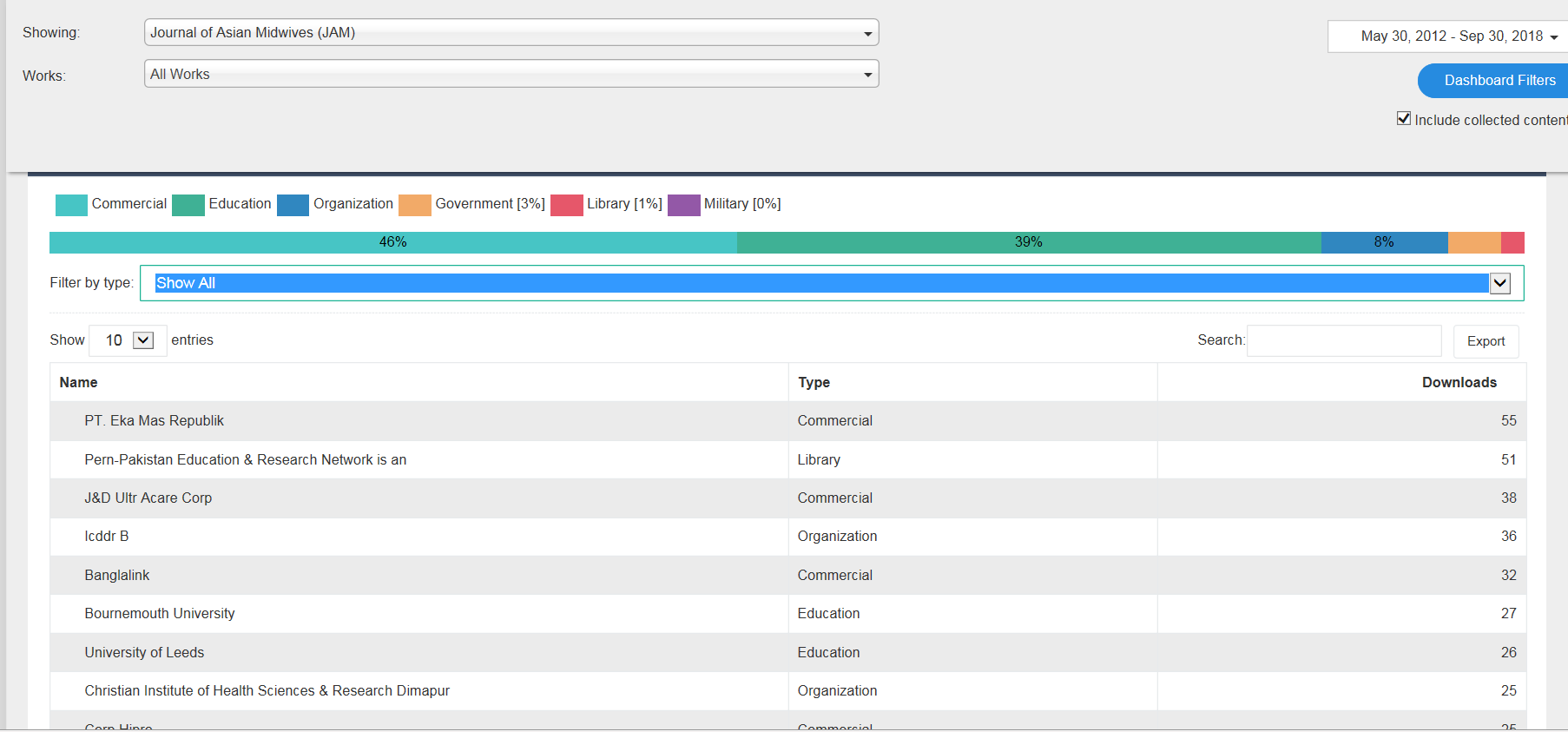




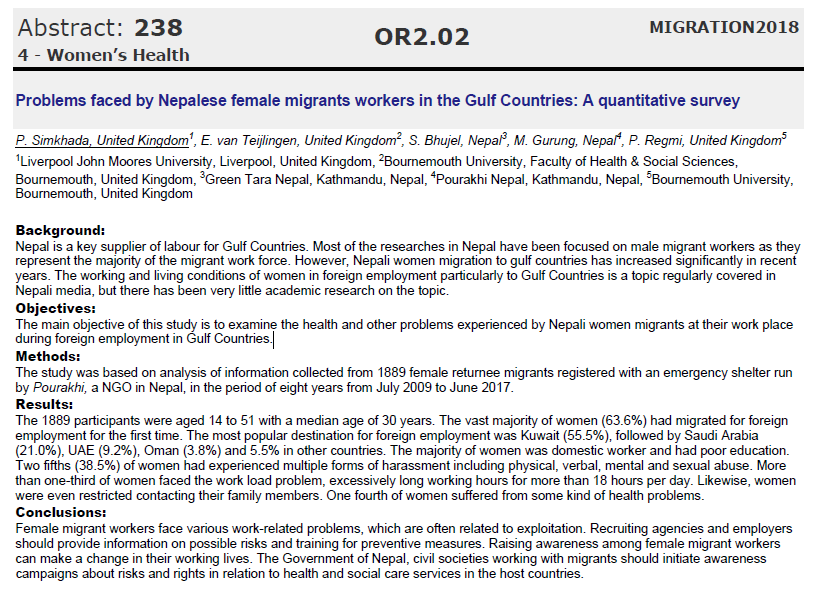


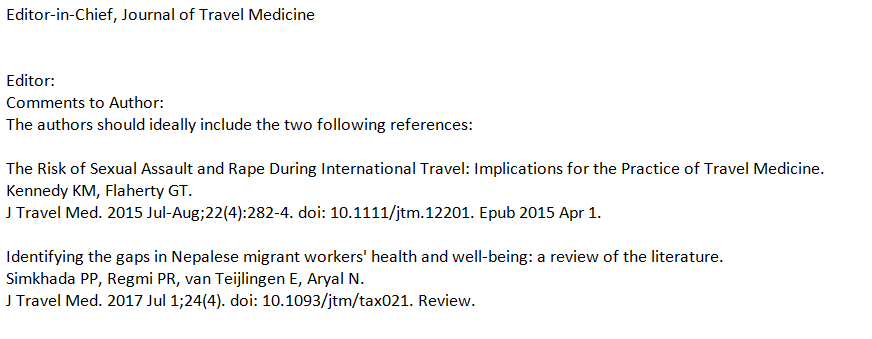
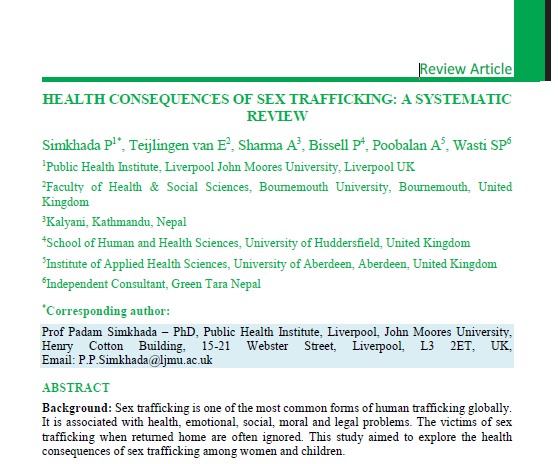
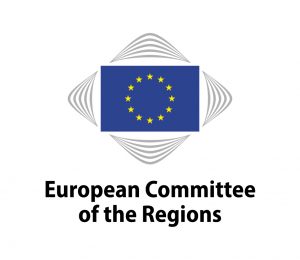

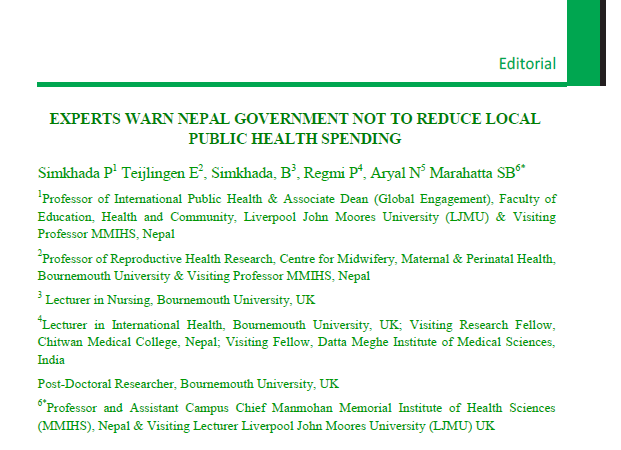
 MSCA Individual Fellowships 2018 Call Submission Rates
MSCA Individual Fellowships 2018 Call Submission Rates Open registration for Societal Challenge 6 Information Day
Open registration for Societal Challenge 6 Information Day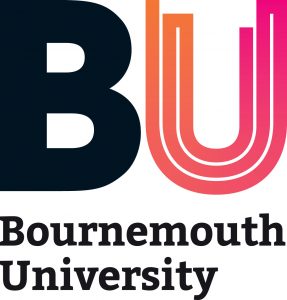 Open registration for UKRO Annual Visit to BU
Open registration for UKRO Annual Visit to BU To find more about Horizon 2020 programme and available funding in your area, visit
To find more about Horizon 2020 programme and available funding in your area, visit  With a slight delay, the European Research Council (ERC) has published the Work Programme for 2019. While the Starting Grant 2019 call is open and preparation of proposals may already be at their final stage, academics may refer to
With a slight delay, the European Research Council (ERC) has published the Work Programme for 2019. While the Starting Grant 2019 call is open and preparation of proposals may already be at their final stage, academics may refer to  The fundamental activity of the ERC is to provide attractive, long-term funding to support excellent investigators and their research teams to pursue ground-breaking, high-gain/high-risk research.
The fundamental activity of the ERC is to provide attractive, long-term funding to support excellent investigators and their research teams to pursue ground-breaking, high-gain/high-risk research.










 Missing Persons Indicator Project Recruitment
Missing Persons Indicator Project Recruitment Celebrating our Research: Postgraduate Research Showcase 2026
Celebrating our Research: Postgraduate Research Showcase 2026 Nursing Research REF Impact in Nepal
Nursing Research REF Impact in Nepal Fourth INRC Symposium: From Clinical Applications to Neuro-Inspired Computation
Fourth INRC Symposium: From Clinical Applications to Neuro-Inspired Computation ESRC Festival of Social Science 2025 – Reflecting back and looking ahead to 2026
ESRC Festival of Social Science 2025 – Reflecting back and looking ahead to 2026 3C Event: Research Culture, Community & Cookies – Tuesday 13 January 10-11am
3C Event: Research Culture, Community & Cookies – Tuesday 13 January 10-11am ECR Funding Open Call: Research Culture & Community Grant – Apply now
ECR Funding Open Call: Research Culture & Community Grant – Apply now MSCA Postdoctoral Fellowships 2025 Call
MSCA Postdoctoral Fellowships 2025 Call ERC Advanced Grant 2025 Webinar
ERC Advanced Grant 2025 Webinar Update on UKRO services
Update on UKRO services European research project exploring use of ‘virtual twins’ to better manage metabolic associated fatty liver disease
European research project exploring use of ‘virtual twins’ to better manage metabolic associated fatty liver disease